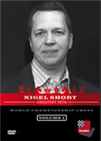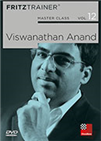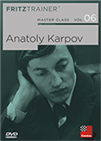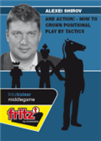The Match of the New Century
 Twice before the 2002 match between Russia and The World had similar encounters been organized. First in Belgrade 1970, when the Soviet team led by Boris Spassky defeated an international squad that had Bent Larssen on board 1 and Bobby Fischer on board 2. The second of such matches was played in London 1984, and once again the Soviets prevailed, this time around having Anatoly Karpov and Garry Kasparov on top boards facing an opposing team led by Ulf Andersson and Jan Timman.
Twice before the 2002 match between Russia and The World had similar encounters been organized. First in Belgrade 1970, when the Soviet team led by Boris Spassky defeated an international squad that had Bent Larssen on board 1 and Bobby Fischer on board 2. The second of such matches was played in London 1984, and once again the Soviets prevailed, this time around having Anatoly Karpov and Garry Kasparov on top boards facing an opposing team led by Ulf Andersson and Jan Timman.
 Nigel Short takes us on an electrifying journey through a very rich chess career, which saw him beat no less than twelve world champions. His experience in tournaments and matches all over the world – Short has visited a total of 89 countries – can be seen in the narratives that precede the games which he annotates with humour and instructive insights.
Nigel Short takes us on an electrifying journey through a very rich chess career, which saw him beat no less than twelve world champions. His experience in tournaments and matches all over the world – Short has visited a total of 89 countries – can be seen in the narratives that precede the games which he annotates with humour and instructive insights.Dubbed the Match of the New Century, the third confrontation was played in Moscow on September 8-12 2002, with the Russian team getting home advantage for the first time. Eighteen years had passed since the second match, but once again Kasparov and Karpov were included in the Russian squad.
Due to the dissolution of the Soviet Union, a number of players from ex-Soviet countries represented The World in 2002. In fact, out of the twelve players in the lineup, only Viswanathan Anand (India), Peter Leko (Hungary), Nigel Short (United Kingdom) and Judit Polgar (Hungary) were non-Soviets.

The World team
Yasser Seirawan, who had played in the 1984 match, was the captain of the World team, and wrote a wonderful report afterwards. This was his reaction when he saw the lineups:
Of the twenty seeded players, sixteen are native Russian speakers. Include the four reserve players and twenty of the twenty-four players speak Russian. What extraordinary dominance of our mind sport! I feel intimidated. I don’t speak Russian. Even my nyet sounds wrong. My speeches will be delivered in English.
This might lead us to think that The World was the big favourite, but the absence of two of their stars — Michael Adams and Veselin Topalov — meant the Russians were considered the favourites despite the average Elo ratings not being that far apart. Seirawan wrote:
I look again at my team. Two of our biggest guns, Michael Adams (ENG) and Veselin Topalov (BLG), are missing. Ouch! With their participation I like our chances. Without them, Russia is a clear favorite. Never mind that Russia will have home advantage as well. This could be a very harsh blow for the World Team.
The match was staged over ten boards, using a Scheveningen System with a rapid time control — 25 minutes for the game plus 10-second increments per move.
 This DVD allows you to learn from the example of one of the best players in the history of chess and from the explanations of the authors how to successfully organise your games strategically, and how to keep your opponent permanently under pressure.
This DVD allows you to learn from the example of one of the best players in the history of chess and from the explanations of the authors how to successfully organise your games strategically, and how to keep your opponent permanently under pressure.
Vishy Anand, an injured Peter Svidler and Judit Polgar

A young Alexander Grischuk (aged 19 at the time)
Russia loses 48:52
Excerpts from the final ChessBase article on the match:
The regular media will ignore big chess events, but if Russia, and especially Garry Kasparov, loses, then it is all over the news. “Russia falls behind in chess”, reported ABC, and “Shock defeat for chess tsars” the Sydney Morning Herald.
The third Russia vs the Rest of the World match ended in an unexpected 52:48 victory for the World team. In the final round we saw an incredible win for Teimour Radjabov against the luckless Vadim Zvjaginsev, who had an overall minus 298 performance in Moscow. Alexei Shirov beat Peter Svidler to score the best result of the tournament: 7 out of 10, with a 2865 performance, 168 points above his personal rating.

Vasyl Ivanchuk v Garry Kasparov
 On this DVD a team of experts looks closely at the secrets of Karpov's games. In more than 7 hours of video, the authors examine four essential aspects of Karpov's superb play.
On this DVD a team of experts looks closely at the secrets of Karpov's games. In more than 7 hours of video, the authors examine four essential aspects of Karpov's superb play.
Ilya Smirin v Anatoly Karpov
Meanwhile, in the final report published on the excellent Olimpbase website, the results of the tournament are summarized thus:
The Russians started strong favourites with an average rating of 2708 (2717 over the top ten boards) as opposed to 2695 (2699 over the top 10), but whereas Kasparov and Kramnik would normally between then be expected to deliver at least +5 (a pretty conservative figure) they in fact managed only -3 which on its own delivers the entire winning margin.
Shirov’s huge 7/10 (including his customary loss to Kasparov) and solid 6/10s from Gelfand, Ivanchuk and Ponomariov (1 loss by Gelfand between the three) were big parts of the victory, as was the 5/10 scored by the lowest rated player in the event, 15-year-old Teimour Radjabov.
Perhaps Kasparov was right that the chances were balanced at the start of the match even though the World were without Adams and Topalov.
Final results
| |
1 |
2 |
3 |
4 |
5 |
6 |
7 |
8 |
9 |
10 |
Total |
| Russia |
4 |
4.5 |
5.5 |
5.5 |
5 |
5 |
5 |
4 |
4.5 |
5 |
48 |
| The World |
6 |
5.5 |
4.5 |
4.5 |
5 |
5 |
5 |
6 |
5.5 |
5 |
52 |
Game of the Day Prizes
- Day 1: Vasyl Ivanchuk for the game against Garry Kasparov
- Day 2: Garry Kasparov for the game against Alexei Shirov
- Day 3: Alexei Shirov for the game against Alexander Motylev
- Day 4: Alexei Shirov for the game against Alexander Grischuk
Individual results
 There are few names which, like that of Alexei Shirov, can be associated with fantastically imaginative and tactically influenced play. Now the Latvian grandmaster is presenting a DVD on precisely that element of the game of chess. And one that is completely based on his own games.
There are few names which, like that of Alexei Shirov, can be associated with fantastically imaginative and tactically influenced play. Now the Latvian grandmaster is presenting a DVD on precisely that element of the game of chess. And one that is completely based on his own games. 1 Shirov, Alexei g ESP 2697 7.0 /10 2865 +168
2 Bareev, Evgeny g RUS 2726 6.0 /10 2770 +44
3 Ivanchuk, Vassily g UKR 2711 6.0 /10 2785 +74
4 Morozevich, Alexander g RUS 2716 6.0 /10 2770 +54
5 Gelfand, Boris g ISR 2710 6.0 /10 2788 +78
6 Ponomariov, Ruslan g UKR 2743 6.0 /10 2785 +42
7 Leko, Peter g HUN 2722 5.5 /10 2752 +30
8 Grischuk, Alexander g RUS 2702 5.5 /10 2726 +24
9 Svidler, Peter g RUS 2690 5.0 / 9 2743 +53
10 Karpov, Anatoly g RUS 2687 5.0 / 9 2736 +49
11 Anand, Viswanathan g IND 2755 5.0 / 9 2760 +5
12 Radjabov, Teimour g AZE 2610 5.0 /10 2705 +95
13 Dreev, Alexey g RUS 2676 4.5 / 8 2728 +52
14 Smirin, Ilia g ISR 2676 4.0 / 9 2662 -14
15 Kramnik, Vladimir g RUS 2807 4.0 / 9 2665 -142
16 Kasparov, Garry g RUS 2838 4.0 /10 2626 -212
17 Khalifman, Alexander g RUS 2690 3.5 / 9 2616 -74
18 Rublevsky, Sergei g RUS 2658 3.0 / 6 2683 +25
19 Short, Nigel D g ENG 2682 2.5 / 8 2572 -110
20 Azmaiparashvili, Zurab g GEO 2676 2.0 / 4 2698 +22
21 Polgar, Judit g HUN 2681 2.0 / 7 2562 -119
22 Akopian, Vladimir g ARM 2678 1.0 / 3 2662 -16
23 Motylev, Alexander g RUS 2634 1.0 / 6 2450 -184
24 Zvjaginsev, Vadim g RUS 2673 0.5 / 4 2375 -298
All games
Links


















 Twice before the 2002 match between Russia and The World had similar encounters been organized. First
Twice before the 2002 match between Russia and The World had similar encounters been organized. First 




